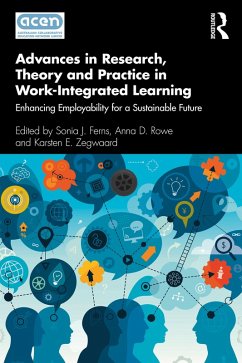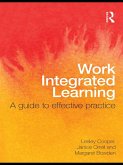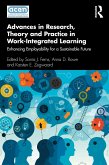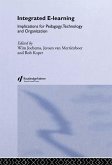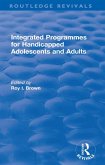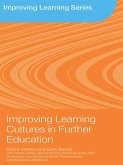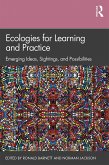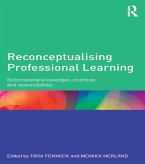Advances in Research, Theory and Practice in Work-Integrated Learning (eBook, PDF)
Enhancing Employability for a Sustainable Future
Redaktion: Ferns, Sonia J.; Zegwaard, Karsten E.; Rowe, Anna D.
37,95 €
37,95 €
inkl. MwSt.
Sofort per Download lieferbar

19 °P sammeln
37,95 €
Als Download kaufen

37,95 €
inkl. MwSt.
Sofort per Download lieferbar

19 °P sammeln
Jetzt verschenken
Alle Infos zum eBook verschenken
37,95 €
inkl. MwSt.
Sofort per Download lieferbar
Alle Infos zum eBook verschenken

19 °P sammeln
Advances in Research, Theory and Practice in Work-Integrated Learning (eBook, PDF)
Enhancing Employability for a Sustainable Future
Redaktion: Ferns, Sonia J.; Zegwaard, Karsten E.; Rowe, Anna D.
- Format: PDF
- Merkliste
- Auf die Merkliste
- Bewerten Bewerten
- Teilen
- Produkt teilen
- Produkterinnerung
- Produkterinnerung

Bitte loggen Sie sich zunächst in Ihr Kundenkonto ein oder registrieren Sie sich bei
bücher.de, um das eBook-Abo tolino select nutzen zu können.
Hier können Sie sich einloggen
Hier können Sie sich einloggen
Sie sind bereits eingeloggt. Klicken Sie auf 2. tolino select Abo, um fortzufahren.

Bitte loggen Sie sich zunächst in Ihr Kundenkonto ein oder registrieren Sie sich bei bücher.de, um das eBook-Abo tolino select nutzen zu können.
This book is essential reading for researchers, practitioners, workplace and community partners, university leaders, and policy makers, who will benefit from insights in the publication, especially as the practice of WIL continues to expand in the higher education sector.
- Geräte: PC
- ohne Kopierschutz
- eBook Hilfe
- Größe: 3.35MB
Andere Kunden interessierten sich auch für
![Work Integrated Learning (eBook, PDF) Work Integrated Learning (eBook, PDF)]() Lesley CooperWork Integrated Learning (eBook, PDF)37,95 €
Lesley CooperWork Integrated Learning (eBook, PDF)37,95 €![Advances in Research, Theory and Practice in Work-Integrated Learning (eBook, ePUB) Advances in Research, Theory and Practice in Work-Integrated Learning (eBook, ePUB)]() Advances in Research, Theory and Practice in Work-Integrated Learning (eBook, ePUB)37,95 €
Advances in Research, Theory and Practice in Work-Integrated Learning (eBook, ePUB)37,95 €![Integrated E-Learning (eBook, PDF) Integrated E-Learning (eBook, PDF)]() Integrated E-Learning (eBook, PDF)55,95 €
Integrated E-Learning (eBook, PDF)55,95 €![Integrated Programmes for Handicapped Adolescents and Adults (eBook, PDF) Integrated Programmes for Handicapped Adolescents and Adults (eBook, PDF)]() Integrated Programmes for Handicapped Adolescents and Adults (eBook, PDF)31,95 €
Integrated Programmes for Handicapped Adolescents and Adults (eBook, PDF)31,95 €![Improving Learning Cultures in Further Education (eBook, PDF) Improving Learning Cultures in Further Education (eBook, PDF)]() David JamesImproving Learning Cultures in Further Education (eBook, PDF)49,95 €
David JamesImproving Learning Cultures in Further Education (eBook, PDF)49,95 €![Ecologies for Learning and Practice (eBook, PDF) Ecologies for Learning and Practice (eBook, PDF)]() Ecologies for Learning and Practice (eBook, PDF)38,95 €
Ecologies for Learning and Practice (eBook, PDF)38,95 €![Reconceptualising Professional Learning (eBook, PDF) Reconceptualising Professional Learning (eBook, PDF)]() Reconceptualising Professional Learning (eBook, PDF)49,95 €
Reconceptualising Professional Learning (eBook, PDF)49,95 €-
-
-
This book is essential reading for researchers, practitioners, workplace and community partners, university leaders, and policy makers, who will benefit from insights in the publication, especially as the practice of WIL continues to expand in the higher education sector.
Dieser Download kann aus rechtlichen Gründen nur mit Rechnungsadresse in A, B, BG, CY, CZ, D, DK, EW, E, FIN, F, GR, HR, H, IRL, I, LT, L, LR, M, NL, PL, P, R, S, SLO, SK ausgeliefert werden.
Produktdetails
- Produktdetails
- Verlag: Taylor & Francis eBooks
- Seitenzahl: 298
- Erscheinungstermin: 1. Oktober 2021
- Englisch
- ISBN-13: 9781000429596
- Artikelnr.: 62549097
- Verlag: Taylor & Francis eBooks
- Seitenzahl: 298
- Erscheinungstermin: 1. Oktober 2021
- Englisch
- ISBN-13: 9781000429596
- Artikelnr.: 62549097
- Herstellerkennzeichnung Die Herstellerinformationen sind derzeit nicht verfügbar.
Sonia J. Ferns, Adjunct Associate Professor, Curtin University, Australia, and Partner, LearnWork Consulting. Anna D. Rowe, Senior Lecturer, Portfolio of the Pro Vice-Chancellor, Education and Student Experience, and School of Education, University of New South Wales, Australia. Karsten E. Zegwaard, Director of Work-Integrated Learning Research, Office of the Vice Chancellor, University of Waikato, New Zealand.
1.Contemporary insights into the practice of work-integrated learning in
Australia Section 1 Teaching and learning within WIL programs 2. The
framing of employability policy and the design of work-integrated learning
curriculum 3. Designing a work-integrated learning curriculum 4. Authentic
assessment design for work-integrated learning Section 2 Engagement with
Stakeholders 5. Engaging stakeholders in work-integrated learning: A
sustainable model for curriculum co-creation 6. Professional accreditation:
A partnership proposition Section 3 Maximizing learning outcomes through
WIL 7. Work, resilience and wellbeing: The long game of work-integrated
learning 8. Effective supervision: A key consideration in work-integrated
learning 9. Support for student learning in work-integrated learning: A
holistic framework 10. A quality framework for developing and assuring
high-quality work-integrated learning curricula 11. Evaluating
work-integrated learning Section 4 Exploring the diverse forms of WIL
practice 12. Innovation in work-integrated learning 13. Developing
university learners' enterprise capabilities through entrepreneurial
work-integrated learning 14. Service-learning as an approach to
work-integrated learning 15. Designing and implementing interdisciplinary
project-based work-integrated learning 16. International students and
work-integrated learning: Overcoming challenges and looking to the future
17. Closing the gap: Facilitating employability development in
international internships Section 5 Support and infrastructure to develop
good WIL practice 18. Leadership that supports an institutional approach to
work-integrated learnings 19. Governance and Risk Management 20. Student
access and equity in work-integrated learning: A work in progress 21.
Using technology platforms for work-integrated learning Section 6 Future
directions 22. The future of work-integrated learning: Vision and insights
Australia Section 1 Teaching and learning within WIL programs 2. The
framing of employability policy and the design of work-integrated learning
curriculum 3. Designing a work-integrated learning curriculum 4. Authentic
assessment design for work-integrated learning Section 2 Engagement with
Stakeholders 5. Engaging stakeholders in work-integrated learning: A
sustainable model for curriculum co-creation 6. Professional accreditation:
A partnership proposition Section 3 Maximizing learning outcomes through
WIL 7. Work, resilience and wellbeing: The long game of work-integrated
learning 8. Effective supervision: A key consideration in work-integrated
learning 9. Support for student learning in work-integrated learning: A
holistic framework 10. A quality framework for developing and assuring
high-quality work-integrated learning curricula 11. Evaluating
work-integrated learning Section 4 Exploring the diverse forms of WIL
practice 12. Innovation in work-integrated learning 13. Developing
university learners' enterprise capabilities through entrepreneurial
work-integrated learning 14. Service-learning as an approach to
work-integrated learning 15. Designing and implementing interdisciplinary
project-based work-integrated learning 16. International students and
work-integrated learning: Overcoming challenges and looking to the future
17. Closing the gap: Facilitating employability development in
international internships Section 5 Support and infrastructure to develop
good WIL practice 18. Leadership that supports an institutional approach to
work-integrated learnings 19. Governance and Risk Management 20. Student
access and equity in work-integrated learning: A work in progress 21.
Using technology platforms for work-integrated learning Section 6 Future
directions 22. The future of work-integrated learning: Vision and insights
1.Contemporary insights into the practice of work-integrated learning in
Australia Section 1 Teaching and learning within WIL programs 2. The
framing of employability policy and the design of work-integrated learning
curriculum 3. Designing a work-integrated learning curriculum 4. Authentic
assessment design for work-integrated learning Section 2 Engagement with
Stakeholders 5. Engaging stakeholders in work-integrated learning: A
sustainable model for curriculum co-creation 6. Professional accreditation:
A partnership proposition Section 3 Maximizing learning outcomes through
WIL 7. Work, resilience and wellbeing: The long game of work-integrated
learning 8. Effective supervision: A key consideration in work-integrated
learning 9. Support for student learning in work-integrated learning: A
holistic framework 10. A quality framework for developing and assuring
high-quality work-integrated learning curricula 11. Evaluating
work-integrated learning Section 4 Exploring the diverse forms of WIL
practice 12. Innovation in work-integrated learning 13. Developing
university learners' enterprise capabilities through entrepreneurial
work-integrated learning 14. Service-learning as an approach to
work-integrated learning 15. Designing and implementing interdisciplinary
project-based work-integrated learning 16. International students and
work-integrated learning: Overcoming challenges and looking to the future
17. Closing the gap: Facilitating employability development in
international internships Section 5 Support and infrastructure to develop
good WIL practice 18. Leadership that supports an institutional approach to
work-integrated learnings 19. Governance and Risk Management 20. Student
access and equity in work-integrated learning: A work in progress 21.
Using technology platforms for work-integrated learning Section 6 Future
directions 22. The future of work-integrated learning: Vision and insights
Australia Section 1 Teaching and learning within WIL programs 2. The
framing of employability policy and the design of work-integrated learning
curriculum 3. Designing a work-integrated learning curriculum 4. Authentic
assessment design for work-integrated learning Section 2 Engagement with
Stakeholders 5. Engaging stakeholders in work-integrated learning: A
sustainable model for curriculum co-creation 6. Professional accreditation:
A partnership proposition Section 3 Maximizing learning outcomes through
WIL 7. Work, resilience and wellbeing: The long game of work-integrated
learning 8. Effective supervision: A key consideration in work-integrated
learning 9. Support for student learning in work-integrated learning: A
holistic framework 10. A quality framework for developing and assuring
high-quality work-integrated learning curricula 11. Evaluating
work-integrated learning Section 4 Exploring the diverse forms of WIL
practice 12. Innovation in work-integrated learning 13. Developing
university learners' enterprise capabilities through entrepreneurial
work-integrated learning 14. Service-learning as an approach to
work-integrated learning 15. Designing and implementing interdisciplinary
project-based work-integrated learning 16. International students and
work-integrated learning: Overcoming challenges and looking to the future
17. Closing the gap: Facilitating employability development in
international internships Section 5 Support and infrastructure to develop
good WIL practice 18. Leadership that supports an institutional approach to
work-integrated learnings 19. Governance and Risk Management 20. Student
access and equity in work-integrated learning: A work in progress 21.
Using technology platforms for work-integrated learning Section 6 Future
directions 22. The future of work-integrated learning: Vision and insights
